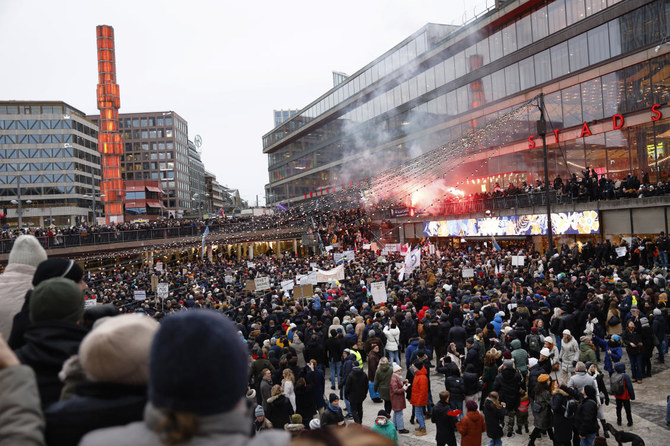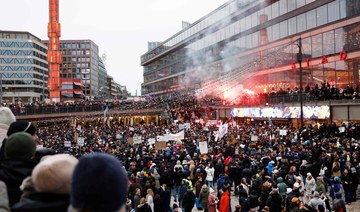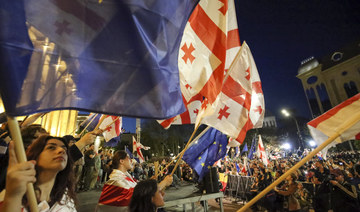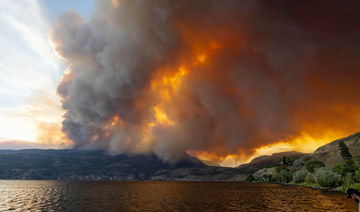COPENHAGEN, Denmark: Sweden announced Wednesday that several coronavirus restrictions will be extended for another two weeks.
Meanwhile neighboring Denmark was expected to announce that it no longer considers COVID-19 as “a socially critical disease” as of next month and will remove most restrictions.
“We have an extremely record high spread of infection,” Sweden’s Social Affairs Minister Lena Hallengren said. “The assessment is that existing measures need to remain in place for another two weeks.”
“If the situation allows it, the restrictions will be lifted after that,” she said.
Karin Tegmark Wisell, head of Sweden’s Public Health Agency, said the reasoning for extending the restrictions is that they expect a decline in cases in a couple of weeks. She said the Scandinavian country had 270,000 new infections in the past seven days and that “our assessment is that, during this period, at least half a million can fall ill per week.”
In Sweden which has previously stood out among European nations for its comparatively hands-off response to the pandemic, has ordered cafes, bars and restaurants to close at 11 p.m., urged people to work from home when possible and said distance learning was an option in higher education to try to combat rising COVID-19 infections.
Denmark, meanwhile, is heading in the opposition direction.
In a letter Tuesday to the Danish lawmakers, Health Minister Magnus Heunicke said he wants to follow the recommendations by Parliament’s Epidemic Commission so that the “categorization of COVID-19 as a socially critical disease will be abolished as of Feb. 1.”
The letter said “this is a new epidemic situation in which a high and increasing infection does not to the same extent as previously translate into hospitalizations.” The letter was obtained by The Associated Press on Wednesday ahead of a planned press conference with Prime Minister Mette Frederiksen.
It was not immediately clear what restrictions Danes will end but they likely will include the digital health pass, which now must be used to enter museums, nightclubs, cafes, party buses and to be seated indoors in restaurants.
In Denmark, people above 15 must also flash the pass when attending outdoor events where the capacity exceeds 2,000.
In Finland, Prime Minister Sanna Marin tweeted that “the government will assess the necessity of (the) restrictions” and “should consider opening low-risk cultural and sports events with a COVID pass and extending the opening hours of restaurants on a quicker schedule than was previously estimated.”
Sweden extends virus restrictions; Danes likely to end them
https://arab.news/pxqbu
Sweden extends virus restrictions; Danes likely to end them

- Denmark was expected to announce that it no longer considers COVID-19 as “a socially critical disease” as of next month and will remove most restrictions
- “We have an extremely record high spread of infection,” Sweden's Social Affairs Minister Lena Hallengren said
Two Americans, one Russian citizen among 20 detained in Georgia, Russia’s TASS reports

- 20 people detained at protests in Tbilisi while Georgian lawmakers were debating a “foreign agents” bill
Tbilisi: Some 1,000 protesters stood firm outside parliament in Georgia on Monday, vowing not to back down in their fight against a Russia-styled “foreign agent” bill, a day before it’s due to be adopted.
Protests have gripped the small Caucasus nation for weeks over the bill, which critics say will erode democracy and derail the ex-Soviet republic’s long-held ambition of joining the European Union.
Critics say the measure, which resembles one Russia has used to crack down on dissent, will steer Tbilisi back under Moscow’s influence.
The ruling Georgian Dream party has portrayed it as necessary for Georgia’s sovereignty, saying it will boost transparency of civil groups’ funding.
The bill is due to go for a third and final reading in parliament on Tuesday.
On Monday, it passed a committee vote, a final step before it goes for a vote in parliament.
The bill targets NGOs that receive foreign funding, with Georgian Dream’s billionaire backer Bidzina Ivanishvili accusing them of working on foreign orders and plotting a revolution.
Part of Tbilisi’s main Rustaveli Avenue was closed off around parliament on Monday.
Hundreds of riot police officers lined a street behind parliament, and some scuffles broke out between them and protesters.
Authorities a day earlier warned that they would arrest people who blocked parliament, but thousands defied the warning and came to the parliament’s gates anyway.
“We are planning to stay here for as long as it takes,” 22-year-old Mariam Kalandadze told AFP.
“This law means not joining Europe,” she said, adding that “this is something that I have wanted my whole life.”
Russia downs 16 Ukraine-launched missiles, 31 drones

- Russian defense ministry: 12 guided missiles were launched from a Ukrainian Vilkha multiple rocket launcher
- Four Storm Shadow aircraft guided missiles and seven drones were downed over Crimea
The Russian defense ministry said on Monday its air defense systems destroyed 16 missiles and 31 drones that Ukraine launched at Russian territory overnight, including 12 missiles over the battered border region of Belgorod.
Five houses were damaged in Belgorod, but according to preliminary information, there were no injuries, Governor Vyacheslav Gladkov wrote on the Telegram messaging app.
On Sunday, 15 people were killed in Belgorod when a section of an apartment block collapsed after being struck by fragments of a Soviet-era missile, launched by Ukraine and shot down by Russian forces, Russia said.
The Russian defense ministry said on Monday the 12 guided missiles were launched from a Ukrainian Vilkha multiple rocket launcher.
The ministry also said four Storm Shadow aircraft guided missiles and seven drones were downed over Crimea, eight drones were destroyed over the Kursk region and four were intercepted over the Lipetsk region.
A drone sparked a short-lived fire at an electrical substation in the Kursk region, Igor Artamonov, the governor of the region in Russia’s south, wrote on Telegram.
“There are no casualties. The fire in the territory of the electrical substation is being extinguished,” Artamonov said.
Reuters could not independently verify the reports.
There was no immediate comment from Ukraine. Kyiv says that targeting Russia’s military, transport and energy infrastructure undermines Moscow’s war effort and is an answer to the countless deadly attacks by Russia.
Western Canada blazes cause evacuations, air quality concerns

- Authorities issued an evacuation order for a community in British Columbia and warn of poor air quality across provinces
TORONTO: The season’s first major wildfires have spread to roughly 10,000 hectares across Western Canada on Sunday as authorities issued an evacuation order for a community in British Columbia and warned of poor air quality across provinces.
In British Columbia, thousands of residents in Northern Rockies Regional Municipality and Fort Nelson First Nations were evacuated as the nearby blaze nearly doubled to 4,136 hectares.
Northern Rockies Regional Municipality Mayor Rob Fraser in a TV interview said most of the 3,500 residents in and around Fort Nelson had been evacuated.
Fort Nelson First Nation, seven kilometers from the town, also issued an evacuation order for Fontas, an Indigenous community.
Across the border in Alberta, residents of Fort McMurray, an oil hub which suffered extensive damage from wildfires in 2016, were asked to prepare to leave.
However, by the end of the day, favorable weather helped by a shower forecast tamed fire growth at Fort McMurray. Authorities said they expected fire activity to remain low with more showers expected on Monday.
Alberta continued to stress the two wildfires were extreme and out of control and recorded 43 active fires, including one located 16km southwest of Fort McMurray. By Sunday, authorities revised the area affected by fire to 6,579 hectares, much larger than what was reported on Friday.
Fraser said the fire was started by a tree blown down by strong winds falling onto a power line.
Six crews of wildland firefighters, 13 helicopters and airtankers were taming the fire on Sunday, said Alberta authorities.
Evacuation alerts were in place for Fort McMurray, Saprae Creek Estates and expanded to Gregoire Lake Estates and Rickards Landing Industrial Park.
Although there is no immediate risk to these communities, the alert ensures residents are prepared to evacuate if conditions change.
Smoke in Fort McMurray on Saturday was coming from fires in northern British Columbia, Alberta said.
Environment Canada issued a special air quality statement that extends from British Columbia to Ontario on Sunday.
Last year, a veil of smoke blanketed the US East Coast, tinging the skies a fluorescent orange as smoke reached parts of Europe as hundreds of forest fires burnt millions of acres of land and forced about 120,000 people to leave their homes.
The federal government has warned Canada faces another “catastrophic” wildfire season as it forecast higher-than-normal spring and summer temperatures across much of the country, boosted by El Nino weather conditions.
Canada experienced one of its warmest winters with low to non-existent snow in many areas, raising fears ahead of a hot summer triggering blazes in forests and wildlands amid an ongoing drought.
India to sign 10-year pact with Iran for Chabahar port management— report

- India has been developing port to transport goods to Iran, Afghanistan and Central Asia to avoid Karachi
- Sanctions imposed by Washington on Iran have slowed down Chabahar port’s development work
NEW DELHI: India is likely to sign an agreement with Iran on Monday to manage the southeastern Iranian port of Chabahar for the next 10 years, the Economic Times reported.
India Shipping Minister Sarbananda Sonowal is likely to travel to Iran to sign the agreement, the report said, citing unidentified sources.
The Indian government did not immediately respond to a request for comment.
India has been developing a part of the port in Chabahar, which is located on Iran’s southeastern coast along the Gulf of Oman, as a way to transport goods to Iran, Afghanistan and central Asian countries that avoids the port of Karachi in its rival Pakistan.
US sanctions on Iran, however, have slowed down the port’s development.
India vote to resume with Kashmir poised to oppose Modi

- Jammu and Kashmir has deeply resented Modi government’s 2019 snap decision to bring territory under its control
- Rebel groups opposed to Indian rule have waged an insurgency since 1989 on frontier controlled by New Delhi
SRINAGAR, India: India’s six-week election is set to resume Monday including in Kashmir, where voters are expected to show their discontent with dramatic changes in the disputed territory under Prime Minister Narendra Modi’s government.
Modi remains popular across much of India and his Hindu-nationalist Bharatiya Janata Party (BJP) is widely expected to win the poll when it concludes early next month.
But his government’s snap decision in 2019 to bring Kashmir under direct rule by New Delhi — and the drastic security clampdown that accompanied it — have been deeply resented among the region’s residents, who will be voting for the first time since the move.
“What we’re telling voters now is that you have to make your voice heard,” said former chief minister Omar Abdullah, whose National Conference party is campaigning for the restoration of Kashmir’s former semi-autonomy.
“The point of view that we want people to send out is that what happened... is not acceptable to them,” he told AFP.
Kashmir has been divided between India and Pakistan since their independence in 1947. Both claim it in full and have fought two wars over control of the Himalayan region.
Rebel groups opposed to Indian rule have waged an insurgency since 1989 on the side of the frontier controlled by New Delhi, demanding either independence or a merger with Pakistan.
The conflict has killed tens of thousands of soldiers, rebels and civilians in the decades since, including a spate of firefights between suspected rebels and security forces in the past month.
Violence has dwindled since the Indian portion of the territory was brought under direct rule five years ago, a move that saw the mass arrest of local political leaders and a months-long telecommunications blackout to forestall expected protests.
Modi’s government says its canceling of Kashmir’s special status has brought “peace and development,” and it has consistently claimed the move was supported by Kashmiris.
But his party has not fielded any candidates in the Kashmir valley for the first time since 1996, and experts say the BJP would have been roundly defeated if it had.
“They would lose, simple as that,” political analyst and historian Sidiq Wahid told AFP last week.
The BJP has appealed to voters to instead support smaller and newly created parties that have publicly aligned with Modi’s policies.
But voters are expected to back one of two established Kashmiri political parties calling for the Modi government’s changes to be reversed.
India’s election is conducted in seven phases over six weeks to ease the immense logistical burden of staging the democratic exercise in the world’s most populous country.
More than 968 million people are eligible to vote in India’s election, with the final round of polling on June 1 and results expected three days later.
Turnout so far has declined significantly from the last national poll in 2019, according to election commission figures.
Analysts have blamed widespread expectations that Modi will easily win a third term and hotter-than-average temperatures heading into the summer.
India’s weather bureau has forecast more hot spells in May and the election commission formed a taskforce last month to review the impact of heat and humidity before each round of voting.


















